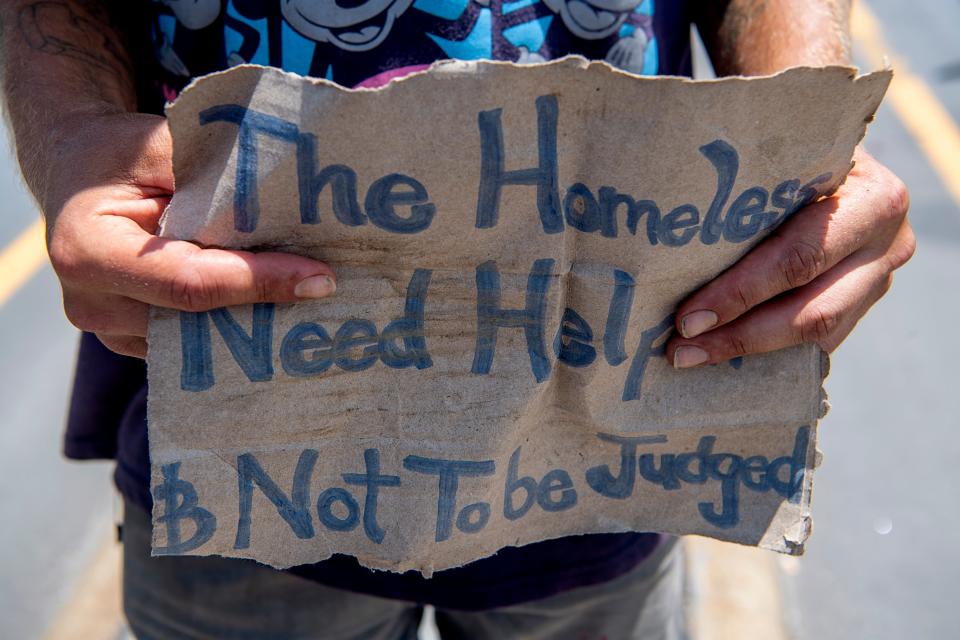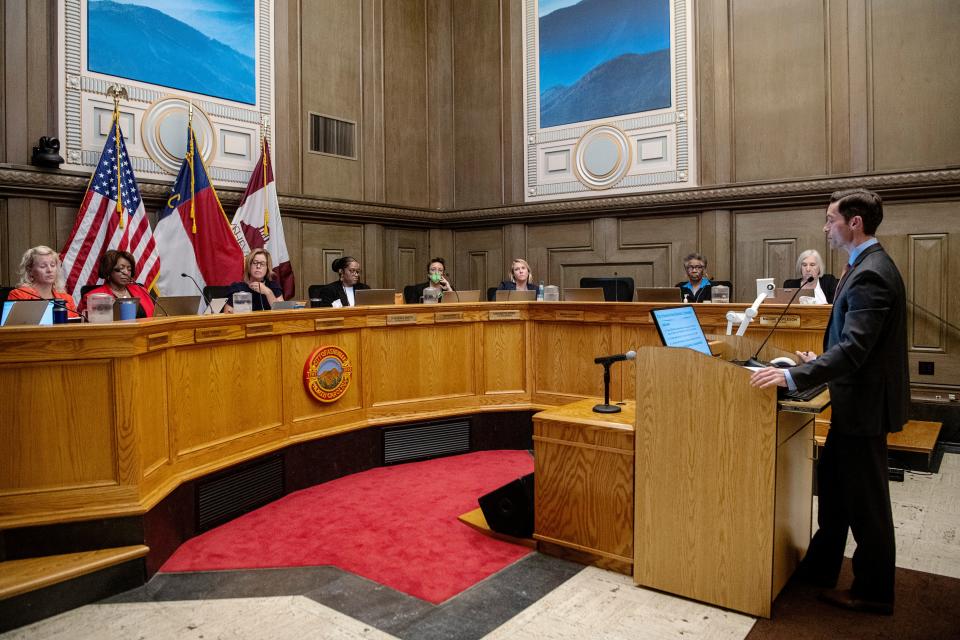Asheville council passes panhandling amendments; ban on vehicle donations to be considered
ASHEVILLE - Technical amendments to city panhandling ordinances were approved after a second reading by Asheville City Council Sept. 12. The amendments modified specific language to longstanding city panhandling ordinances ended the first phase of changes regarding the city’s non-solicitation ordinances.
The second phase, set to come before the City Council in early October, will consider “substantive amendments,” which currently focus on restricting donations from vehicles and increasing the number of high-traffic zones.
The technical amendments passed with a vote of 6-0 during the meeting, with Councilmember Kim Roney attending by phone due to illness. Roney stated her opposition to the ordinance, despite not being able to vote.
During the previous meeting when the amendments were first read, the amendments saw pushback during public comment, with some fearing the amendments may "create bigger need." Public comment was not available during the Sept. 12 meeting.
Currently, violation of the ordinance results in the charge of a Class 3 misdemeanor and a fine of no more than $500.

Roney responds to ordinance proposals: Asheville council member Roney responds to public safety open letter with 'amendment'
Mars Hill passes ban: With changes to Asheville ordinances pending, Mars Hill approves panhandling ban
What do the technical amendments do?
The technical amendments specify certain elements of the panhandling ordinances. Specifically, the change restricts panhandling 8 feet away from individuals who have “made a negative response verbally, by physical sign, by attempting to leave the presence of the person soliciting, or by other negative indication,” according to amendment documents.
The technical modifications come in response to U.S. Supreme Court rulings, including City of Austin v. Reagan and Reed v. Town of Gilbert, which required an update of language used in existing city panhandling ordinances. The amendments were not intended to expand existing regulations or penalties, City Attorney Brad Branham said.
"They add no new penalties, no additional or increased criminal or civil penalties," Branham said Sept. 12. "But they are purely to add some specificity and remove some ambiguity in the current language of our preexisting ordinances."
The technical amendments added and modified language in Asheville City Code sections 11-5 and 11-14, both of which pertain to panhandling and solicitation.

Substantive amendments may regulate vehicle donations
The “substantive amendments" consider increasing the number of high-traffic zones and prohibit giving from a vehicle. The amendments are returning to the Environment and Safety Committee for further consideration on Sept. 26.
If approved at committee, the amendments will come to the City Council on Oct. 10, alongside opportunity for public comment.
Currently, additional restrictions regarding restricting solicitation communication and the time of day one can panhandle apply in high traffic zones.
During the July 25 Environment and Safety Committee meeting, committee members discussed expanding the number of high traffic zones to include Haywood Road in West Asheville and the River Arts District, alongside restricting donations from vehicles.
While public comment was not available during the Sept. 12 meeting, two residents took to giving their opinion on the ordinance.
Jensen Gelfond, who spoke during the time for general comment, encouraged more community input on the amendments.
"I want to encourage the city to think about a deeper level of engagement with citizens," Gelfond said. "Even a deeper level of engagement with people who are soliciting or panhandling. How can you know exactly what to do about this situation if we don't even reach out to the people who will be affected most?
"There are lots of things to be thinking about here. How is a $500 fine for soliciting, when someone breaks that 8-foot barrier, going to affect them when they can't pay it?" Gelfond said.
Grace Baron, who commented on the ordinance during the approval for the Aug. 22 City Council meeting minutes, believes that "most people did not realize we had this ordinance to begin with."
Baron disagreed with the decision to approve the amendments.
"People don't have money, so you're going to charge them a misdemeanor that will cost them money that they don't have," Baron said.
More: Buncombe commissioners OK expansion of low-barrier shelter beds. How many are coming?
More: Karen Cragnolin Park greenway is now open; former brownfield site is missing link
Will Hofmann is the Growth and Development Reporter for the Asheville Citizen Times, part of the USA Today Network. Got a tip? Email him at WHofmann@citizentimes.com.
This article originally appeared on Asheville Citizen Times: Asheville City Council passes panhandling amendments

